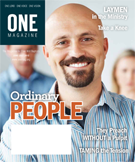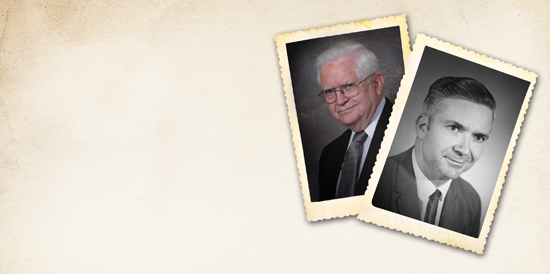
June-July 2012
Ordinary People
----------------------
|

Celebrating 50 Years Together....
Leroy Forlines and the Commission for Theological Integrity
by Paul V. Harrison
Leroy Forlines has left an indelible imprint upon the Free Will Baptist denomination. One particular area involves the Commission for Theological Integrity. The fascinating history of the Commission begins at the 1959 national meeting in Asheville, North Carolina. The Resolutions Committee presented and the body passed the following:
Whereas our American heritage has suffered at the hands of theological liberalism and other encroachments, and
Whereas Protestant denominations have been engulfed by infidelity to the Bible, and
Whereas the progress of missions has been hindered by the modernists’ social gospel, and
Whereas Scriptural education has been replaced by non-Christian philosophies in many schools, and
Whereas the Free Will Baptist denomination is not immune to those dangers,
Therefore, be it resolved that a commission be appointed to study the menaces of theological liberalism, secularism, worldliness, etc., and
Be it further resolved that a report of this commission’s work be made to this body at the next session.
The next year in Fresno, California, this newly formed commission, made up of Ronald Creech, Bobby Jackson, Paul J. Ketteman, N. R. Smith, and chaired by R. Eugene Waddell, reported: “As we see it, Free Will Baptists are approaching a crossroads. Within the decade additional measures should be taken to insure our future against modernism or else trends toward liberalism might set the stage for false doctrine in years to come.” They added: “More care should be taken by ordaining councils in ordination.” They further recommended that the commission be made a permanent part of the denomination’s structure.
Behind the scenes, the group was even more pointed in its concern over the future of the denomination. In response to a private questionnaire regarding the commission, Waddell wrote: “The future of F.W.B.s could well be hanging in the balance of our work.” Creech put it this way: “This work can make us or break us, maybe save or ruin our denomination.”
Though busy finishing up his graduate studies and therefore unable to attend the 1962 national association in Nashville, F. Leroy Forlines was elected to serve on the new Commission. The 1963 national minutes indicate that Brother Forlines was selected to chair the Commission. With the exception of a few years in the late 1960s when Wade Jernigan served as chairman, Professor Forlines has directed the Commission since its beginning. The 2012 national association therefore marks the completion of 50 years of service by Brother Forlines on the Commission.
In his role, Brother Forlines worked alongside many influential Free Will Baptist leaders including L. C. Johnson, J. D. O’Donnell, Wade Jernigan, Van Dale Hudson, Jack Parramore, Mark Vandevort, Bill Jones, Willie Justice, Edwin Wade, to name a few.
The Commission work, especially early in its existence, was strictly focused on issues of modernism and liberalism. In a February 7, 2012, interview, Forlines said the Commission’s task over the years has thankfully been one “not of rooting out but preventing.”
It is interesting that in 1970, some were urging the Commission to investigate individuals within the denomination. The national minutes of 1970 state: “it is our understanding that this is not a ‘Witch Hunt Committee.’” The next year, under Forlines’s leadership, the Commission stated: “This is not an investigative commission with the purpose of accusing individuals. The Commission will strictly deal with issues.”
The Commission has evolved somewhat over the years. Reflecting a broader area of responsibility, in 1986 the group was renamed the Commission for Theological Integrity, whose purpose is outlined in the Free Will Baptist Treatise:
“The purpose of this Commission shall be: (a) To alert our people of theological trends that could threaten our theological integrity as a denomination. (b) To prepare materials that will contribute to the continued preservation of the theological integrity of our denomination. (c) As the need and opportunity arise to conduct seminars on subjects which are pertinent to the purpose of this Commission.”
Under Forlines’ leadership and springing from these guidelines, a seminar has been hosted for many years at the National Association of Free Will Baptists. Additionally, annual symposia in which theological papers by Free Will Baptists are read and discussed have been held since 1997. In 2000, the Commission began publishing Integrity: A Journal of Christian Thought.
The Commission, and Brother Forlines in particular, addressed many of the controversial issues that rocked the Christian community in recent decades. For example, in 1978, he penned the booklet Inerrancy and the Scriptures, asserting “what it [the Bible] affirms to be true is true” (p. 15). He further noted “since the product is called the Word of God, we must conclude that the inspiration of the Holy Spirit so influenced the writers of the Bible that they did not introduce error into their writing” (p. 20).
For many years, Forlines preached, taught, and wrote against “cheap-easy believism,” the idea that genuine Christian faith could exist in harmony with a “light view of sin and holiness.” He wrote: “Such a position has no support in Scripture” (p. 5, Cheap-Easy Believism). Back in 1975 he lamented: “The church has weakened its standards and preaching about sin,” concluding, “we need some prophets in our pulpits” (p. 25).
In 1982, Forlines wrote a scathing denunciation of “health and wealth” preachers. Responding to “name it and claim it” proponents, the Commission chairman stated: “Faith does not put us in the driver’s seat giving orders to God on how to run the universe or what to do about a specific part of the universe that concerns us. Rather, faith is believing the promises of God” and “we must have a specific promise before we can have specific faith” (Prophets of Prosperity, p. 21).
He addressed other topics including the broader charismatic movement, evolution, Bible versions, cooperative evangelism with non-Free Will Baptists such as Billy Graham, etc. In spite of varying viewpoints in the denomination, Forlines never allowed the Commission “to become a political football” (interview, February 7, 2012).
Forlines is quick to say that the work of the Commission and the denomination is not over. Our greatest need, he says, is “to settle what salvation is.” Harking back to his battles with cheap-easy believism, he sees the current invasion of carnality into the Church as a terrible development. He recently said that if in print one from our ranks were to espouse “salvation without holiness,” our leaders would rise up in alarm, but it’s happening right now in our churches with little apparent concern. He warned: “The situation that is ahead of us now is harder than was ahead of us when the Commission was formed.”
Forlines is still pleading for prophets of holiness, who will help us restore “a Christian culture in the Church.” He asserted: “We’ve got to get down to the moral foundations of the Ten Commandments.”
We commend Leroy Forlines for his faithful leadership of the Commission in days gone by and pray that his call for theological fidelity will continue to be heard during the challenging days before us.
About the Writer: Paul V. Harrison pastors Cross Timbers FWB Church near Nashville, TN. He serves on the Commission for Theological Integrity.
|
|

